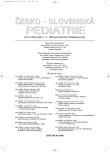-
Medical journals
- Career
Brain-type Natriuretic Peptide (BNP) and Cardiovascular Risk in Children
Authors: M. Mráz 1; M. Urbanová 2; P. Wohlfahrt 2; Ľ. Podracká 1
Authors‘ workplace: I. Klinika detí a dorastu LF UPJŠ a DFN, Košice prednostka prof. MUDr. Ľ. Podracká, CSc. 1; Lekárska fakulta UPJŠ, Košice 2
Published in: Čes-slov Pediat 2006; 61 (2): 89-94.
Category: Comprehensive Report
Overview
Increased plasmatic concentration of brain-type natriuretic peptide (BNP) is a sensitive and specific marker of left ventricular dysfunction in adults with cardiovascular diseases. However, such data in children are lacking. Authors of the review focus on the relationship between BNP concentration in plasma and cardiovascular morbidity in children at risk.
Key words:
brain-type natriuretic peptide, cardiovascular risk, children
Labels
Neonatology Paediatrics General practitioner for children and adolescents
Article was published inCzech-Slovak Pediatrics

2006 Issue 2-
All articles in this issue
- Occurrence of Polymorphism of Tumor Necrosis Factor Alpha (TNFα-308) in Children with Chronic Inflammatory Bowel Diseases
- Low Cardiac Output and Myocardial Function Following Cardiac Surgical Treatment in Children – is there a Difference in the Effect of Phosphodiesterase Inhibitors?
- Care of the Newborns on the Waves of Time or View to the History of the Neonatology
- Neonatal Hyperekplexia
- Brain-type Natriuretic Peptide (BNP) and Cardiovascular Risk in Children
- Procalcitonin – its Present Position in the Diagnosis and Prognosis of Inflammation A review
- Czech-Slovak Pediatrics
- Journal archive
- Current issue
- Online only
- About the journal
Most read in this issue- Care of the Newborns on the Waves of Time or View to the History of the Neonatology
- Neonatal Hyperekplexia
- Procalcitonin – its Present Position in the Diagnosis and Prognosis of Inflammation A review
- Brain-type Natriuretic Peptide (BNP) and Cardiovascular Risk in Children
Login#ADS_BOTTOM_SCRIPTS#Forgotten passwordEnter the email address that you registered with. We will send you instructions on how to set a new password.
- Career

